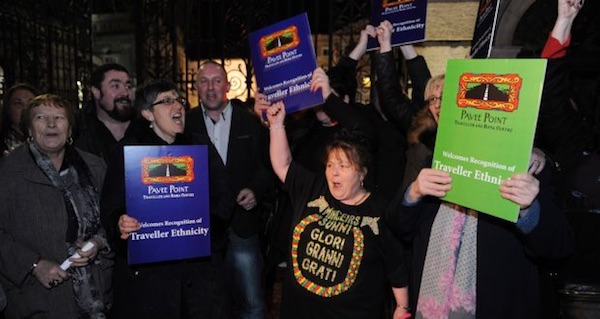
Irish Travellers have been recognised as an indigenous ethnic minority in a historic declaration in the Dublin parliament.
Taoiseach Enda Kenny got a rare standing ovation in the Dail as he uttered words many of those attending had been waiting more than 30 years to hear.
“I wish to now formally recognise Travellers as an ethnic group. It is a historic day for our Travellers and a proud day for Ireland. “
Although hundreds of Travellers were kept out of Leinster House during the vote due to health and safety fears, there was a carnival atmosphere as they celebrated the moment.
President Michael D Higgins said the formal recognition was a “momentous decision, formally recognising Travellers’ place in Irish society”.
“I have written to the Travellers organisations that have campaigned and worked on this issue for many years, to convey my congratulations and appreciation for their work,” he said.
“I have no doubt that today’s clarification will be of assistance in interpreting legislation in relation to Travellers’ rights, and ensuring respect for Travellers’ distinct identity within the fabric of Irish society.”
Recent research has shown that the origins of the gypsy-like Traveller community may date as far back as 420 years to 1597. The Plantation of Ulster began around that time, with native Irish displaced from the land to form a nomadic population.
The study also indicates that while Travellers originally descended from the general Irish population, they are now very distinct from it. Travellers have always self-identified as a distinct group, and that self-identification is now, officially, being respected.
Speaking on Irish radio, former director of the Irish Traveller Movement Brigid Quilligan said the 40,000-strong community was overjoyed that their identity will be valued.
Ms Quilligan said while Traveller culture and distinct ethnicity was recognised by the settled population, it was seen as negative thing rather than positive.
“We want every Traveller in Ireland to be proud of who they are and to say that we’re not a failed set of people,” she said. “We have our own unique identity and we shouldn’t take on all of the negative aspects of what people think about us.
“We should be able to be proud and for that to happen our State needed to acknowledge our identity and our ethnicity and they’re doing that today.”
The last major government statement on the Travelling community was the 1963 Report of the Commission on Itinerancy. Travellers were, “despised as inferior beings and are regarded as the dregs of society”, it read. It talked of how best to achieve their “absorption into the general community”, even giving serious consideration to the “solution” of “itinerant [Traveller] children being taken from their families and placed in institutions”.
In one generation, it claimed, “itinerants as a class would disappear”.
Although not conferring new rights to the community, the move ended over 50 years of official policy which characterised Travellers as a “problem”.
It is hoped that ethnic recognition will allow Traveller children in particular to stop hiding their identity, and remove the stigma associated with it by some in the settled community.
Sinn Fein leader Gerry Adams said it was a “momentous step forward for equality” and a “hugely historic moment for the 40,000 members of our Traveller community”.
He said it was an “important symbolic acknowledgement. It also must pave the way for real, practical change. Action must follow ethnicity.”
![[Irish Republican News]](https://republican-news.org/graphics/title_gifs/rn.gif)
![[Irish Republican News]](https://republican-news.org/graphics/title_gifs/harp.gif)

